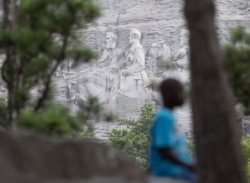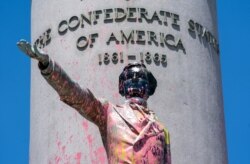The United States celebrates its Independence Day holiday this weekend as a campaign to remove symbols of the country's pro-slavery legacy gains momentum.
Efforts to remove monuments that celebrate the Confederacy, a government of 11 slave-holding southern states that seceded from the United States, triggering the Civil War in 1861, began to gain momentum in 2015 after a white supremacist fatally shot nine African Americans inside a church in Charleston, South Carolina.
The campaign further escalated after George Floyd, an African American, died in police custody May 25 in Minneapolis, Minnesota.
The Stone Mountain Confederate Memorial, the world's largest Confederate monument, is among the many memorials that have been the focus of the removal campaign.
The 518-meter-high carving that was substantially funded by the Ku Klux Klan features Confederate President Jefferson Davis, and Confederate generals Robert E. Lee and Thomas "Stonewall" Jackson, all of whom were enslavers. Members of the Klan continue to periodically gather at the memorial.
One of the most recent memorials to be taken down was a statue of General Jackson in Richmond, Virginia, a state with more Confederate memorials than any other. Workers started to take down the statue of the Confederate general on Wednesday after Richmond's mayor called for its "immediate removal."
Protesters toppled a statue of Davis in Richmond, the capital of the Confederacy, on June 10.
Also Wednesday, Mississippi, the only state that continued to incorporate the Confederate emblem on its official flag, retired the banner in a quiet ceremony in the capital city of Jackson. The flag was sent to a nearby museum after Governor Tate Reeves signed legislation ordering its removal.
U.S. President Donald Trump signed an executive order on June 26 to protect statues, monuments and memorials. The move came days after police halted protesters' efforts to topple a statue of President Andrew Jackson in a park across Pennsylvania Avenue from the White House. Jackson was also a slave holder.
Trump visited the Mount Rushmore National Memorial on Friday to celebrate Independence Day. The 18-meter-high granite carving in the Black Hills of South Dakota depicts slave-holding presidents George Washington and Thomas Jefferson, and Presidents Abraham Lincoln and Theodore Roosevelt.
Some Native American groups have been protesting the Mount Rushmore memorial, noting the Black Hills were taken from the native Lakota people.
Confederate memorials have also been taken down recently in other states.
In Mobile, Alabama, a statue of Confederate Admiral Raphael Semmes was removed in early June and placed in storage days later after city officials agreed to do so.
A statue of former Vice President John C. Calhoun, a defender of slavery, was removed from a pedestal in Charleston, South Carolina on June 24 after the city council's approval.
Many African Americans and a growing number of people of other racial groups believe symbols of the Confederacy have racist connotations while many white people, particularly in southern states, maintain they are part of the area's heritage.
The fight for racial justice continues as America celebrates Independence Day on July 4, despite a part of the U.S. Declaration of Independence, written by President Jefferson, that says, "All men are created equal."









